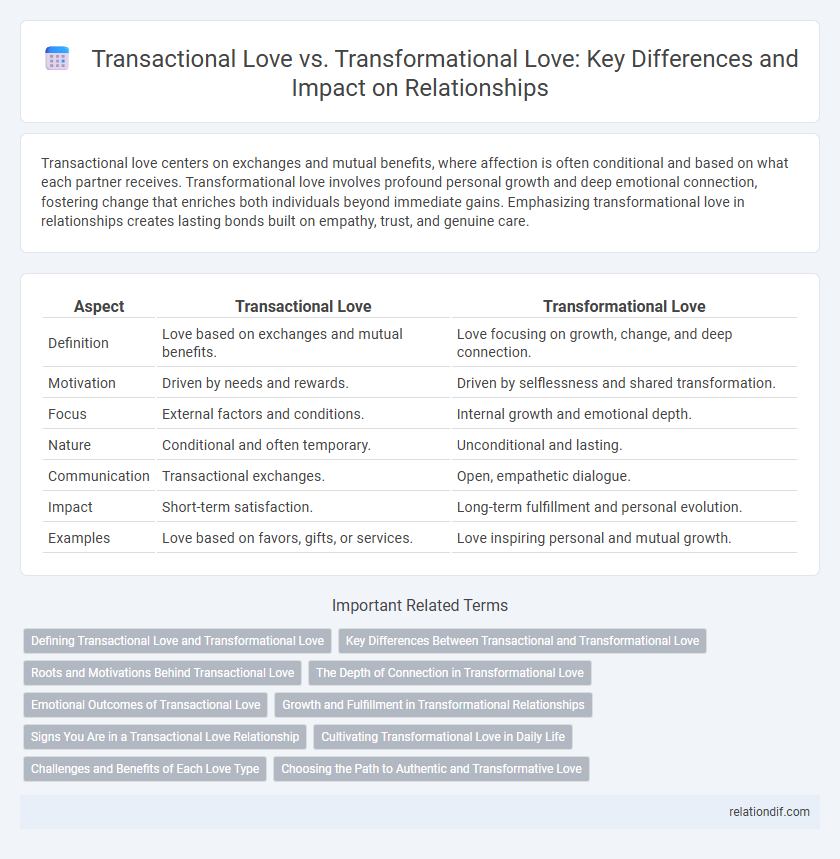Transactional love centers on exchanges and mutual benefits, where affection is often conditional and based on what each partner receives. Transformational love involves profound personal growth and deep emotional connection, fostering change that enriches both individuals beyond immediate gains. Emphasizing transformational love in relationships creates lasting bonds built on empathy, trust, and genuine care.
Table of Comparison
| Aspect | Transactional Love | Transformational Love |
|---|---|---|
| Definition | Love based on exchanges and mutual benefits. | Love focusing on growth, change, and deep connection. |
| Motivation | Driven by needs and rewards. | Driven by selflessness and shared transformation. |
| Focus | External factors and conditions. | Internal growth and emotional depth. |
| Nature | Conditional and often temporary. | Unconditional and lasting. |
| Communication | Transactional exchanges. | Open, empathetic dialogue. |
| Impact | Short-term satisfaction. | Long-term fulfillment and personal evolution. |
| Examples | Love based on favors, gifts, or services. | Love inspiring personal and mutual growth. |
Defining Transactional Love and Transformational Love
Transactional love is characterized by exchanges based on conditions, expectations, and benefits, where affection is often contingent upon meeting specific needs or agreements. Transformational love transcends these exchanges, fostering profound personal growth, emotional connection, and unconditional commitment that transforms both partners. Defining these types clarifies how transactional love centers on reciprocity, while transformational love emphasizes deep, lasting change and mutual evolution in relationships.
Key Differences Between Transactional and Transformational Love
Transactional love centers on exchanges and expectations, where affection is often conditional and based on rewards or benefits received. Transformational love involves deep emotional growth, mutual support, and selfless commitment, fostering positive change in both partners. The key difference lies in transactional love's focus on needs fulfillment versus transformational love's emphasis on personal and relational evolution.
Roots and Motivations Behind Transactional Love
Transactional love stems from self-interest and external rewards, where affection is exchanged based on benefits or conditions met. Its roots lie in pragmatic needs, such as security, social status, or emotional comfort, driving individuals to engage in relationships with predictable outcomes. This form of love prioritizes personal gain over deep emotional connection, often leading to conditional and temporary bonds.
The Depth of Connection in Transformational Love
Transformational love fosters a profound depth of connection characterized by emotional vulnerability, mutual growth, and authentic understanding beyond surface-level exchanges. Unlike transactional love, which hinges on reciprocal benefits and conditional interactions, transformational love cultivates a bond where partners evolve together, transcending individual needs. This deeper connection enhances empathy, trust, and long-term commitment, creating a solid foundation for enduring relationships.
Emotional Outcomes of Transactional Love
Transactional love often results in emotional outcomes characterized by conditional affection and insecurity, as partners may feel valued only for specific exchanges or benefits. This form of love can lead to feelings of dissatisfaction, emotional withdrawal, and a lack of deep connection due to its dependence on external rewards. Over time, transactional love may foster emotional instability and reduced trust, undermining long-term relational fulfillment.
Growth and Fulfillment in Transformational Relationships
Transformational love fosters profound personal growth and emotional fulfillment by encouraging vulnerability, mutual support, and shared goals, distinguishing it from transactional love, which is based on exchanges and conditional benefits. In transformational relationships, partners inspire each other to evolve beyond their limitations, cultivating deeper connection and self-awareness. This dynamic nurtures long-term satisfaction and a sense of purpose, elevating the partnership beyond mere transaction.
Signs You Are in a Transactional Love Relationship
Signs you are in a transactional love relationship include frequent negotiations over personal favors, love expressed conditionally based on benefits received, and a predominant focus on exchanges rather than emotional connection. Partners often measure affection through tangible rewards or reciprocal actions instead of mutual growth and vulnerability. This dynamic can lead to emotional distance as the relationship centers on what each person can gain rather than shared transformation.
Cultivating Transformational Love in Daily Life
Cultivating transformational love in daily life involves prioritizing emotional growth, empathy, and mutual support over mere exchanges of affection or benefits typical of transactional love. This deeper form of love fosters lasting connections by encouraging vulnerability, active listening, and selflessness in relationships. Practicing gratitude, open communication, and consistent acts of kindness nurtures an environment where transformational love can thrive and evolve continuously.
Challenges and Benefits of Each Love Type
Transactional love often faces challenges such as conditional expectations and limited emotional depth, leading to instability in relationships. It benefits individuals by providing clear boundaries and immediate gratification, fostering a sense of security through agreed exchanges. Transformational love, while demanding vulnerability and continuous personal growth, cultivates profound emotional connection and resilience, ultimately enriching partners' lives through mutual evolution.
Choosing the Path to Authentic and Transformative Love
Transactional love centers on exchanges and conditional affection, often leading to superficial and short-lived connections. Transformational love, by contrast, fosters deep personal growth and mutual empowerment, creating lasting bonds grounded in authenticity and emotional resilience. Choosing transformational love encourages vulnerability, empathy, and commitment, making it the path to genuine, meaningful relationships.
Transactional Love vs Transformational Love Infographic

 relationdif.com
relationdif.com